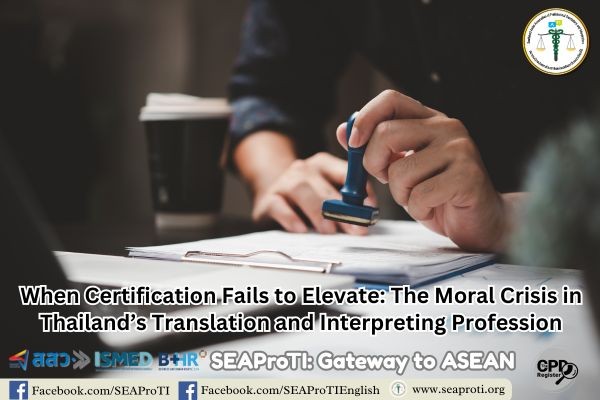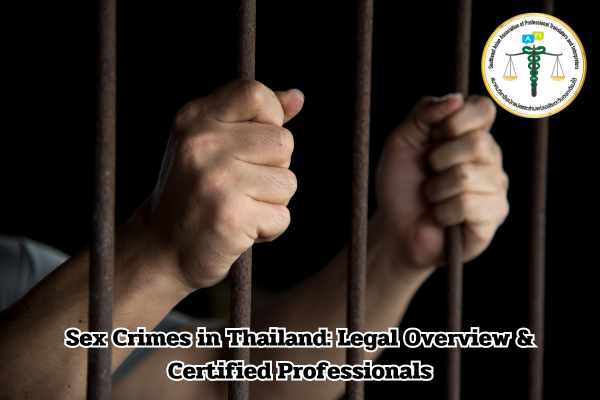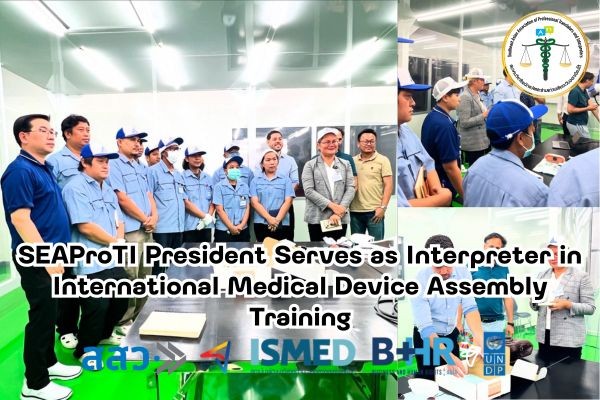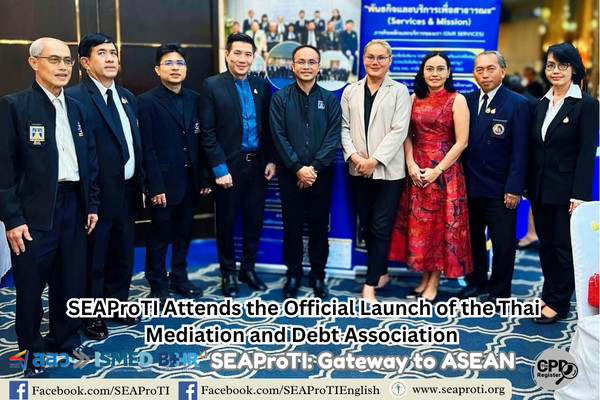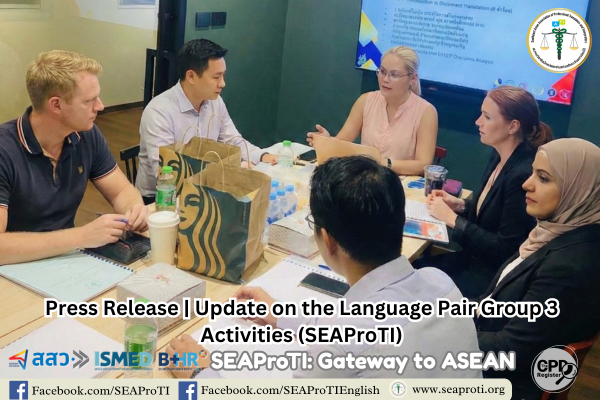When Certification Fails to Elevate: The Moral Crisis in Thailand’s Translation and Interpreting Profession
Author: Wanitcha Sumanat, President of Southeast Asian Association of Professional Translators and Interpreters (SEAProTI)
4 November 2025, Bangkok – In recent years, professional certification has become a social marker of prestige in Thailand’s translation and interpreting community. However, when certification systems lack ethical foundations, their meaning shifts from “professional responsibility” to “personal status.” This paper examines the moral crisis emerging from a certification culture detached from professional ethics, exploring how ego, hierarchy, and social division have replaced humility and public service. It concludes by proposing ethical reform and continuous professional development as mechanisms for restoring trust and moral integrity in the profession.
In contemporary Thai society, being “certified” is often viewed as a sign of superiority rather than a pledge to act with integrity and courtesy (Pym, 2012). The pursuit of certificates, without a corresponding commitment to ethical practice, has led to what Baker and Maier (2011) describe as an ethical vacuum—a condition where technical competence replaces moral consciousness.
The Moral Crisis in Professional Certification
Certification as a Social Symbol
For many practitioners, certification functions as a badge of honor rather than an assurance of competence (Chesterman, 2001). This shift transforms certification into an instrument of professional stratification, an emblem of ego rather than service. The result is a culture of certificationism, where status overshadows substance.
Lack of Ethical Oversight and Post-Certification Accountability
A system that certifies professionals but lacks ethical oversight cannot truly elevate a profession (NAATI, 2023). Models such as NAATI in Australia and NRPSI in the United Kingdom include complaint mechanisms, disciplinary action, and even revocation of credentials in cases of misconduct (NRPSI, 2022). In Thailand, however, such disciplinary systems remain largely absent, allowing certificates to function as decorative symbols rather than ethical obligations.
Absence of Professional Culture
A professional culture entails awareness that language skills are tools for communication and understanding, not for demonstrating authority (Baker & Maier, 2011). Yet in a certification-centered environment, some certified translators and interpreters misuse their status to exclude or demean others, eroding mutual respect and professional solidarity.
Assessing Skills Without Ethical Disposition
Most examinations measure linguistic or technical ability while ignoring moral judgment and collaborative behavior (Chesterman, 2001). As a result, the system produces linguistically capable but ethically indifferent practitioners, individuals who may excel in language but lack empathy or responsibility toward clients and colleagues. Chesterman’s (2001) concept of the Hieronymic Oath calls precisely for the opposite: translators who uphold virtue above personal gain.
Consequences for the Professional Community
The disconnection between certification and ethical practice has led to several forms of professional decline:
- Certificationism: Practitioners are valued based on certificates rather than their actual work.
- Internal Division: Certified individuals sometimes ostracize or belittle non-certified peers.
- Client Distrust: Clients begin to question whether “certified” truly means “ethical.”
- Institutional Discredit: Certifying bodies lose credibility when they fail to discipline unethical members.
Towards Ethical Reform in Certification
Integrating Ethics into Certification Systems
Certification programs must embed a Professional Ethics Code with binding disciplinary power (NAATI, 2023). The legitimacy of a certification system depends not only on testing competence but also on its capacity for ethical accountability.
Ethical Attitude Assessment in Examinations
Testing should include case-based ethical assessment to evaluate candidates’ decision-making in real-life scenarios (Baker & Maier, 2011). Such assessments reflect a shift from testing linguistic accuracy alone to measuring professional integrity and moral reasoning.
Continuous Professional Development (CPD)
Certification should not be permanent. Renewal must require evidence of continuous professional development in knowledge, skills, and ethical awareness (Pym, 2012). CPD ensures that certification remains a living commitment rather than a static credential.
Cultivating Epistemic Humility
Chesterman (2001) introduces the notion of epistemic humility, the awareness of one’s own limitations and the willingness to keep learning. Certified professionals should see their credentials not as symbols of superiority but as promises to serve with empathy and accountability.
Conclusion
Professional certification should function as a moral covenant, not merely a personal achievement (Pym, 2012). Without virtue, humility, and public accountability, certification risks becoming an engine of ego and division. To elevate Thailand’s translation and interpreting profession, reform must begin with restoring the moral spirit of professionalism where integrity and respect for humanity stand above titles and paper credentials.
References
- Baker, M., & Maier, C. (2011). Ethics in interpreter and translator training: Critical perspectives. The Interpreter and Translator Trainer, 5(1), 1–14.
- Chesterman, A. (2001). Proposal for a Hieronymic Oath. The Translator, 7(2), 139–154.
- National Accreditation Authority for Translators and Interpreters (NAATI). (2023). Code of Ethics and Conduct. https://www.naati.com.au/
- National Register of Public Service Interpreters (NRPSI). (2022). Code of Conduct. https://www.nrpsi.org.uk/
- Pym, A. (2012). On Translator Ethics: Principles for Mediation Between Cultures. John Benjamins.
The Southeast Asian Association of Professional Translators and Interpreters (SEAProTI) has formally announced the qualifications and requirements for registration of Certified Translators, Translation Certification Providers, and Certified Interpreters in Sections 9 and 10 of the Royal Gazette, published by the Secretariat of the Cabinet, Office of the Prime Minister of Thailand, on 25 July 2024 (Vol. 141, Part 66 Ng, p. 100). Certified Translators, Translation Certification Providers, and Certified Interpreters
The Council of State has proposed the enactment of a Royal Decree, granting registered translators and recognized translation certifiers from professional associations or accredited language institutions the authority to provide legally valid translation certification (Letter to SEAProTI dated April 28, 2025)
SEAProTI is the first professional association in Thailand and Southeast Asia to implement a comprehensive certification system for translators, certifiers, and interpreters.
Head Office: Baan Ratchakru Building, No. 33, Room 402, Soi Phahonyothin 5, Phahonyothin Road, Phaya Thai District, Bangkok 10400, Thailand
Email: hello@seaproti.com | Tel.: (+66) 2-114-3128 (Office hours: Mon–Fri, 09:00–17:00)
เมื่อใบรับรองไม่ยกระดับคน: วิกฤตศีลธรรมในวงการนักแปลและล่ามไทย
บทความโดย วณิชชา สุมานัส นายกสมาคมวิชาชีพนักแปลและล่ามแห่งเอเชียตะวันออกเฉียงใต้ (SEAProTI)
4 พฤศจิกายน 2568, กรุงเทพมหานคร – ในยุคที่การรับรองวิชาชีพ (Certification) ถูกใช้เป็นเครื่องมือแสดงสถานะทางสังคม ความหมายของ “ความเป็นมืออาชีพ” ในวงการนักแปลและล่ามไทยกำลังถูกบิดเบือนจากรากฐานของจรรยาบรรณและคุณธรรม บทความนี้สำรวจปัญหาทางศีลธรรมที่เกิดขึ้นเมื่อใบรับรองถูกแยกขาดจากความรับผิดชอบทางวิชาชีพ พร้อมนำเสนอแนวทางการสร้างระบบรับรองที่ยึดโยงกับจิตสำนึกทางสังคม (social conscience) และการพัฒนาอย่างต่อเนื่อง (continuous professional development) เพื่อฟื้นฟูความเชื่อมั่นในวิชาชีพ
ในสังคมไทย การ “ได้รับการรับรอง” มักถูกมองว่าเป็นเครื่องยืนยันความสามารถและความเหนือกว่าผู้อื่น มากกว่าจะเป็นคำมั่นว่าจะปฏิบัติหน้าที่อย่างมีคุณธรรมและความสุภาพ (Pym, 2012) การเน้นเพียงการได้มาซึ่งใบประกาศ โดยละเลยจิตวิญญาณของความเป็นมืออาชีพ ทำให้การรับรองกลายเป็นสิ่งที่ Baker และ Maier (2011) เรียกว่า “ethical vacuum” หรือภาวะไร้มิติทางศีลธรรมในระบบอาชีพ
วิกฤตศีลธรรมในระบบการรับรอง
การรับรองที่กลายเป็นตราทางสังคม
การรับรองถูกใช้เป็นเครื่องหมายแห่งเกียรติยศส่วนบุคคล มากกว่าการเป็นมาตรฐานของความสามารถ (Chesterman, 2001) ในหลายกรณี ผู้ได้รับใบรับรองบางคนใช้สถานะดังกล่าวเพื่อสร้างลำดับชั้นทางอาชีพ (“ฉันสอบผ่าน เธอไม่ผ่าน”) ซึ่งสะท้อนการเปลี่ยนจาก “จิตวิญญาณแห่งการรับใช้” ไปสู่ “ลัทธิใบประกาศ” (certificationism)
การขาดระบบควบคุมและจรรยาบรรณหลังการรับรอง
แม้ว่าจะมีการสอบและออกใบรับรอง แต่หากไม่มีระบบตรวจสอบทางจรรยาบรรณ (ethical oversight) ระบบนั้นย่อมไม่อาจยกระดับวิชาชีพได้จริง (NAATI, 2023) ตัวอย่างเช่น NAATI ในออสเตรเลียและ NRPSI ในสหราชอาณาจักร มีทั้งกลไกร้องเรียน การตรวจสอบ และการเพิกถอนใบอนุญาตหากมีการละเมิดจรรยาบรรณ (NRPSI, 2022) กลไกเช่นนี้ยังขาดในบริบทไทย ซึ่งส่งผลให้ “การรับรอง” กลายเป็นเพียงเครื่องประดับทางอาชีพ
การขาดวัฒนธรรมวิชาชีพ
“วัฒนธรรมวิชาชีพ” (professional culture) หมายถึงความตระหนักว่า ทักษะภาษาเป็นเครื่องมือเพื่อสร้างความเข้าใจ มิใช่เพื่อแสดงอำนาจ (Baker & Maier, 2011) อย่างไรก็ตาม ในสังคมที่การรับรองถูกใช้เป็นเกราะกำบังแห่งอีโก้ นักแปลและล่ามบางคนกลับใช้ใบรับรองเพื่อแบ่งแยกและกีดกันผู้อื่น นำไปสู่บรรยากาศแห่งความระแวงและความไม่ไว้วางใจในวงวิชาชีพ
การสอบที่วัดเพียงทักษะ แต่ไม่วัดจิตสำนึก
การสอบส่วนใหญ่เน้นการทดสอบด้านภาษาศาสตร์หรือเทคนิคการแปล โดยละเลยการประเมินคุณธรรมและทัศนคติ (ethical disposition) (Chesterman, 2001) ผลคือได้ผู้ที่มีความสามารถทางภาษาแต่ขาด empathy และความรับผิดชอบต่อสังคม ซึ่งขัดกับหลักการพื้นฐานของ “Hieronymic Oath” ที่เสนอให้ผู้แปลยึดมั่นในคุณธรรมเหนือผลประโยชน์ส่วนตน (Chesterman, 2001)
ผลกระทบต่อวงการวิชาชีพ
การลดทอนคุณค่าของใบรับรองให้เหลือเพียง “ตราทางสังคม” ก่อให้เกิดผลทางลบหลายประการ ได้แก่
- การเกิดลัทธิใบประกาศ (Certificationism): การตัดสินคุณค่าของนักแปลจากเอกสารมากกว่าผลงานจริง
- ความแตกแยกในวงวิชาชีพ: ผู้ถือใบรับรองบางกลุ่มใช้สถานะของตนเป็นเครื่องแบ่งแยกและกีดกัน
- การเสื่อมศรัทธาของลูกค้า: ผู้ใช้บริการไม่มั่นใจว่า “ได้รับการรับรอง” หมายถึง “มีจรรยาบรรณ”
แนวทางสู่การปฏิรูประบบรับรอง
การผนวกจรรยาบรรณเข้ากับระบบรับรอง
ระบบการรับรองควรมี Professional Ethics Code ที่มีผลผูกพันทางวินัย พร้อมกระบวนการสอบสวนและเพิกถอนใบรับรองหากมีการละเมิด (NAATI, 2023) เพราะความน่าเชื่อถือของระบบอยู่ที่ความยุติธรรมและความกล้ารับผิด
การวัดทัศนคติด้านศีลธรรมในกระบวนการสอบ
การสอบควรเพิ่มส่วนของ case-based ethical assessment เพื่อประเมินการตัดสินใจทางจรรยาบรรณในสถานการณ์จริง ซึ่งเป็นแนวทางที่สถาบันการแปลในยุโรปและออสเตรเลียเริ่มนำมาใช้ (Baker & Maier, 2011)
การพัฒนาอย่างต่อเนื่อง (CPD)
การรับรองไม่ควรเป็นสิทธิถาวร แต่ควรถูกต่ออายุด้วยการแสดงหลักฐานการพัฒนาทางวิชาชีพอย่างต่อเนื่อง ทั้งด้านความรู้ ทักษะ และจิตสำนึกทางศีลธรรม (Pym, 2012)
การสร้างวัฒนธรรม “ความถ่อมตนในความรู้”
Chesterman (2001) เสนอแนวคิด “epistemic humility” ว่าผู้แปลควรตระหนักถึงขอบเขตของความรู้ตนเอง และใช้ใบรับรองเป็นคำมั่นว่าจะเรียนรู้อย่างไม่สิ้นสุด ไม่ใช่เป็นตรายืนยันความเหนือกว่า
บทสรุป
ใบรับรองทางวิชาชีพควรเป็น “พันธะทางศีลธรรม” มากกว่า “เกียรติยศส่วนบุคคล” (Pym, 2012) หากปราศจากคุณธรรมและจิตวิญญาณแห่งความรับผิดชอบ ระบบรับรองจะกลายเป็นเพียงกลไกสร้างอำนาจและความแตกแยก การยกระดับวิชาชีพนักแปลและล่ามไทยจึงต้องเริ่มจากการสร้างวัฒนธรรมแห่งคุณธรรม ความสุภาพ และการเคารพต่อมนุษย์ทุกคนที่อยู่เบื้องหลังทุกถ้อยคำแปล
เอกสารอ้างอิง (References)
- Baker, M., & Maier, C. (2011). Ethics in interpreter and translator training: Critical perspectives. The Interpreter and Translator Trainer, 5(1), 1–14.
- Chesterman, A. (2001). Proposal for a Hieronymic Oath. The Translator, 7(2), 139–154.
- National Accreditation Authority for Translators and Interpreters (NAATI). (2023). Code of Ethics and Conduct. https://www.naati.com.au/
- National Register of Public Service Interpreters (NRPSI). (2022). Code of Conduct. https://www.nrpsi.org.uk/
- Pym, A. (2012). On Translator Ethics: Principles for Mediation Between Cultures. John Benjamins.
สมาคมวิชาชีพนักแปลและล่ามแห่งเอเชียตะวันออกเฉียงใต้ (SEAProTI) ได้ประกาศหลักเกณฑ์และคุณสมบัติผู้ที่ขึ้นทะเบียนเป็น “นักแปลรับรอง (Certified Translators) และผู้รับรองการแปล (Translation Certification Providers) และล่ามรับรอง (Certified Interpreters)” ของสมาคม หมวดที่ 9 และหมวดที่ 10 ในราชกิจจานุเบกษา ของสำนักเลขาธิการคณะรัฐมนตรี ในสำนักนายกรัฐมนตรี แห่งราชอาณาจักรไทย ลงวันที่ 25 ก.ค. 2567 เล่มที่ 141 ตอนที่ 66 ง หน้า 100 อ่านฉบับเต็มได้ที่: นักแปลรับรอง ผู้รับรองการแปล และล่ามรับรอง
สำนักคณะกรรมการกฤษฎีกาเสนอให้ตราเป็นพระราชกฤษฎีกา โดยกำหนดให้นักแปลที่ขึ้นทะเบียน รวมถึงผู้รับรองการแปลจากสมาคมวิชาชีพหรือสถาบันสอนภาษาที่มีการอบรมและขึ้นทะเบียน สามารถรับรองคำแปลได้ (จดหมายถึงสมาคม SEAProTI ลงวันที่ 28 เม.ย. 2568)
สมาคมวิชาชีพนักแปลและล่ามแห่งเอเชียตะวันออกเฉียงใต้ เป็นสมาคมวิชาชีพแห่งแรกในประเทศไทยและภูมิภาคเอเชียตะวันออกเฉียงใต้ที่มีระบบรับรองนักแปลรับรอง ผู้รับรองการแปล และล่ามรับรอง
สำนักงานใหญ่: อาคารบ้านราชครู เลขที่ 33 ห้อง 402 ซอยพหลโยธิน 5 ถนนพหลโยธิน แขวงพญาไท เขตพญาไท กรุงเทพมหานคร 10400 ประเทศไทย
อีเมล: hello@seaproti.com โทรศัพท์: (+66) 2-114-3128 (เวลาทำการ: วันจันทร์–วันศุกร์ เวลา 09.00–17.00 น.


